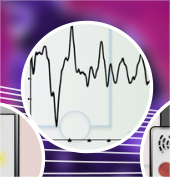
This review highlights the technological aspects of an emerging healthcare platform designed to cope with the increasing global prevalence of chronic neurological disorders associated with the elderly. Wearable technologies connected through the Internet of Things (IoT) platform are revolutionizing patient care delivery. This new technology offers a bridge for the lateralization of the current healthcare system, incorporating patients as important actors in disease management, reducing costs and improving diagnostics and treatment outcomes. Characterized by large individual variability in clinical progression and treatment needs, Parkinson’s disease presents as an excellent model for this paradigm shift. Unobtrusive low-cost wearable sensors are attached close to the patient’s body to collect bio-potentials, motion and environmental data in nearly any scenario. These data are distributed through the IoT platform, analyzed by smart algorithms and transformed into knowledge. This allows for an individualized monitoring of disease progression and treatment. In addition to contributing device- and self-assessment data, patients may choose to share this information with peers and caregivers around the world. The terms for the ethical handling of these data including privacy and ownership are being currently debated. An innovative era in Parkinson’s disease management is approaching with several potential benefits and new challenges.

